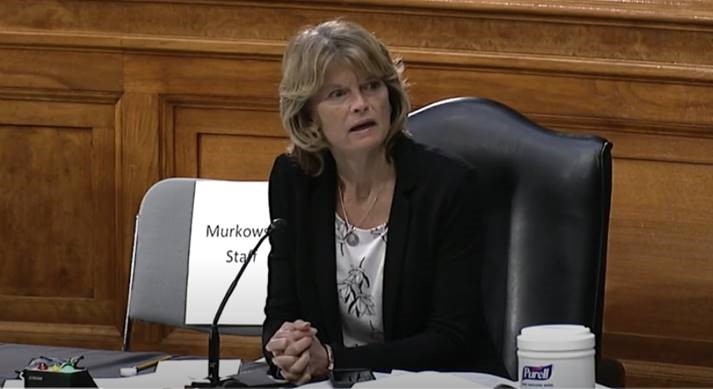Murkowski Calls for Rapid COVID-19 Testing in Alaska
Cordova - Case in Point
U.S. Senator Lisa Murkowski (R-AK) took part in a Senate HELP Committee hearing entitled “Shark Tank: New Tests for COVID-19.” The hearing focused on the current status of testing for the COVID-19 virus and how the National Institutes of Health (NIH) and the Biomedical Advanced Research and Development Authority (BARDA) are working to support the rapid development of new tests for COVID-19, through the NIH Rapid Acceleration of Diagnostics (RADx) Initiative and other programs.

Click here for video of Senator Murkowski
During the hearing, Senator Murkowski spoke to the unique limitations in rural and remote environments when it comes to COVID-19 testing and the need to ensure accurate, timely testing—even for communities that do not have high rates of COVID-19 cases. Murkowski specifically highlighted the safety precautions being taken by the small town of Cordova, a strong fishing community in Alaska which provides $50 million plus in annual revenue, who recently had their first confirmed case of COVID-19.
“All out of state workers are gathered in Seattle and put up in a hotel room. There are security guards at the door. They are tested and then they wait until the tests come back. If they are cleared then they are put on an airplane, either a charter or Alaska Airlines, and flown direct into Cordova. They are then put on a special bus and taken directly to the processing facility where they are administered a second test. It was on that second test that this individual tested positive and they got the results just yesterday. The individual was asymptomatic,” said Senator Murkowski.
Senator Murkowski shared further that Cordova is a community that is completely cut off from the rest of the world, accessible only by plane. Three Abbott testing devices are in the community for the fisheries, while other COVID-19 tests are administered by swab and then flown to Anchorage to get the results. The community with a population of 2,000, which will double in size during the summer months, currently has 1,300 tests available. In light of these challenges, Senator Murkowski questioned Dr. Francis Collins, the Director of the NIH, on what NIH can provide to ensure the safety of the workers and residents in Cordova and all Alaskans, emphasizing that accurate, at-point testing will be necessary to protect small, remote communities.
“You’ve mentioned the RADx UP demonstration,” said Senator Murkowski. “You’ve indicated that it is intended for those areas that are hard hit. We don’t want Cordova to be hard hit. Because if Cordova is hard hit, that fishery doesn’t move forward and it’s not just Cordova’s fishery that doesn’t move forward. It is the Bristol Bay fishery that will be coming up in another month that is going through these same protocols here to try to determine if it’s even possible to open up a fishery. This is our economy. So I appreciate what you’re saying about testing for those that are hard hit, but this is your stress test in the Shark Tank. What are you going to give me?”
Dr. Collins confirmed that NIH aims to provide more accurate, at-point COVID-19 testing by the end of the summer which produces results within an hour. He acknowledged the need to provide testing that does not require shipping tests to get results. He also commended the Senator for raising the point that just because a community has not been hard-hit by the virus, does not mean they are not at risk for becoming hard-hit if adequate testing isn’t available.
BACKGROUND:
The RADx program, launched April 29, is a new public-private partnership to support the rapid development of next kinds of tests for COVID-19. It is being funded with the $1.5 billion appropriated to the NIH and an additional $1 billion appropriated to BARDA that was included in the Paycheck Protection Program and Health Care Enhancement Act. Proposals will be reviewed through a competitive “shark-tank” like process. NIH will bring in industry experts and other scientists to evaluate the potential of the technology for both effectiveness and scalability. NIH began soliciting projects for RADx on a rolling basis on April 29.
COVID-19 SAFETY NOTICE:
In accordance with the U.S. Senate’s Attending Physician and the U.S. Senate Sergeant at Arms, in consultation with the Department of Health and Human Services and the Center for Disease Control and Prevention, Senate hearings have enacted the following adjustments to help ensure the health and safety of all participants during the COVID-19 pandemic: Members were seated six feet apart to respect social distancing guidelines; Participants were given the option to take part in the hearing by video conference; To maintain social distancing, very limited seating was accommodated; Members wore masks to and from the hearing room, but were allowed to remove masks during the hearing, if they chose to do so, as they were seated 6 feet from other members.
The full hearing can be viewed here.








